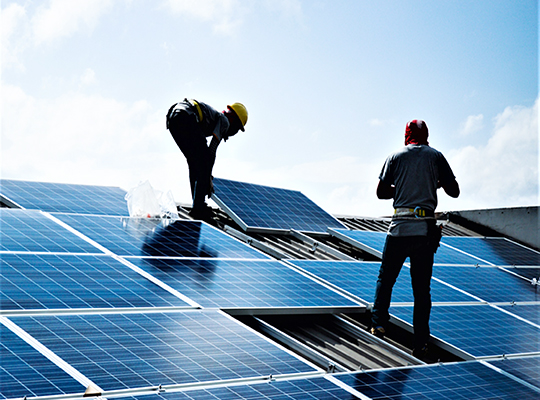COVID-19 pandemic has caused direct or indirect effects on every industry. It has brought the world to a standstill and has impacted our lives deeply. Solar energy sector has been highly affected in these unprecedented times. With the prevailing uncertainties in the industry, the solar energy sector is trying to bounce back in business to achieve the renewable energy target of 100 GW by 2022 set by the Government. Solar rooftop sector has been badly affected because of two reasons: one is its labour cost and other one is its dependence on the country’s commercial and industrial sectors. Today in India the present power demand has reduced by 25-30 per cent. This decline in demand with reduced collection and slow recovery will adversely impact stressed distribution companies a cash gap of approx. Rs. 40,000 cr.
Impact of Covid -19 on Solar Energy Sector
Due to covid-19 and nationwide lockdown, ongoing Solar projects in the country have been completely shut, power companies are facing disruption and installation companies are concerned about the delays in their projects because of the production slowdown in China. In India, the solar industry is relying on China for around 80% of its requirement of solar supply. Due to lockdown, top Industry players have been facing delays in procurement of modules, solar cells, and other components. About most of the labourers who are associated with the solar energy sector are migrants, many of which have returned to their villages due to job loss and nationwide lockdown so there is no workforce available in the market. Even though force majeure conditions will enable the extension for completion period; migrant labours will take quite some time to reach project sites due to fear of covid.
Revival strategy of solar energy sector
The solar capacity addition in India in the first quarter of 2020 was the lowest since 2016. According to a recent report by the International Energy Agency (IEA), In 2021, the solar energy sector is expected to spring back up again as currently delayed projects start to come back online. In 2021, it expects to reach the same level of renewable capacity additions globally as in 2019. The solar energy sector is at the cusp of this opportunity as it delivers cheaper, cleaner electricity – with the right regulatory and policy framework. Moreover, the number of direct and indirect jobs that will be created as a result of the construction and maintenance of solar rooftop plants will be an added advantage post the lockdown will be lifted to revive the economy.
After lockdown, we expect all incremental power capacity addition to be from renewable energy, especially solar energy. Thus, investment in, and capacity roll-out of the solar sector is a precursor to the health of the economy. This pandemic is also a lesson for most of the Companies to not rely solely on one country for their technical equipment and move towards being more diversified and domestic production of commodities. The construction phase of solar however, is very employment-intensive and, to some extent, operation and maintenance of solar generate significant employment in our communities. Thus, Job security and job creation in the solar sector will probably be the most important factors to revive the economy of the country post-COVID-19.
Government’s boost to solar energy sector
The Government of India has also taken measures to help the solar energy companies such as a cut in repo rate to 4.4 per cent, three months moratorium on principal and interest repayment for term loan, and working capital facilities to revive the solar energy sector. The solar industry is seeking some respite from the government so that they can work towards meeting the long-term renewable energy targets of the country. More targeted policy introductions need to be done to support decentralized projects such as Rooftop Solar and provide incentives to domestic production of Solar cells, modules, and other equipment.
Recently, the International Renewable Energy Agency’s (IRENA) Coalition for Action comprising over 100 companies in the renewable energy industry from across the world wrote to their governments putting forth recommendations on how governments can ensure a speedy recovery of the economy of the solar rooftop sector. Recently, Prime Minister Narendra Modi highlighted the importance of building local manufacturing capacity while launching a 750-MW solar plant in Madhya Pradesh.

His statement of a liquidity injection package of Rs 90,000 crore to power distribution companies as part of the Centre’s ‘Atmanirbhar Bharat Abhiyan’ economic stimulus. Once the lockdown will be completely lifted, more financial aid is required to boost local manufacturing. The government should grant more financial aid to the solar energy sector and a decentralized model of solar energy development that does not endanger grasslands and desert ecosystems.









